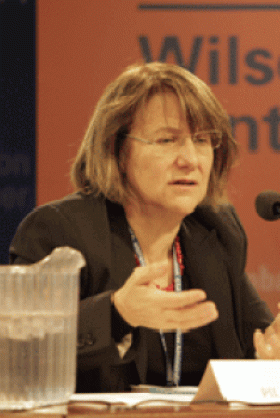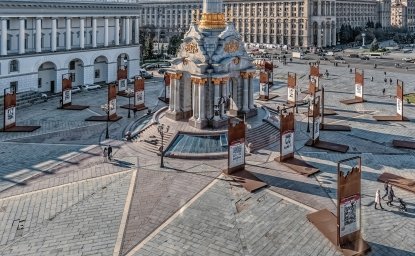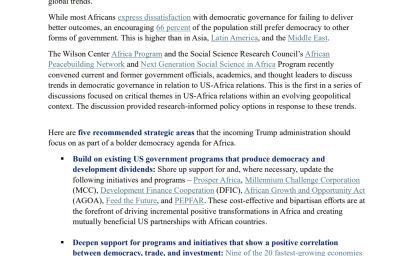"We Have Not Given Enough Thought to How Painful the Soviet Union’s Collapse Was"



Interview with Pilar Bonet, Chief Correspondent in Moscow, El País, upon the completion of her Wilson Center Public Policy Scholarship, “The Long Agony of the Russian Empire and its Legacy,” Spring 2013
Mary Elizabeth Malinkin: During your Public Policy scholarship you have been examining “The Long Agony of the Russian Empire and its Legacy.” What are the most important aspects of its legacy, in your opinion?
Pilar Bonet: I am dealing with specific problems, the problems of borders, territories that have not been recognized, fragments that have been left. My main thought is that psychologically, it takes a long time to get rid of an Empire, and, in this case, the Soviet Union. Young people tend to forget that the Soviet Union existed, that the Soviet Union was a real entity, and we have not given enough thought to how painful its collapse was. Maybe not for certain groups, but certainly for people who really thought they were citizens of this country and then suddenly they were thrown off, to drift away at sea, not knowing where they were heading, and with much fewer opportunities in many cases. There are many people who say that the Soviet Union gave them more opportunities, providing education, guaranteeing careers, and developing people as human beings. Just consider the situation of women in some of the republics. In the past if you were a clever Tajik woman you could have a career, now—forget it. So there are things that have been lost at the individual and community levels. New identities are being formed but they are not very solid yet; there are a lot of contradictions, problems, and not everything is going forward towards modernity. On the contrary, many things are going backwards to the Middle Ages. This is a long, long process which has to be experienced. You can destroy a country or an empire in a minute by signing a piece of paper, but that doesn’t mean the process will be over in a minute. The Belavezha Accords, the agreement to dissolve the Soviet Union, were signed on the 8th of December of 1991, but it takes a long time, psychologically and culturally, from the point of view of identities. I’m not only interested in what is new, but in what remains of the old, and in how it is overcome.
You have covered “frozen conflicts” in the former Soviet Union—Transnistria, Abkhazia and South Ossetia, and Nagorno-Karabakh—for many years. In what ways are they “frozen” and how do the three situations differ from each other?
These three places are the core of my book because they are clear territories which were in the matrioshka structure of the Soviet Union - they were located at one of the lower levels. They didn’t have the right to secede, but in the end they reacted to the centripetal forces, the forces which were pushing them out, stating that they wanted to remain in the Soviet Union. Each of the cases is different. In the case of Transnistria, you have a Slavic population on the left bank of the Dniester, an area that had been part of Ukraine between 1924-1941, that didn’t want to follow the Romanian and Moldovan nationalists who rediscovered their cultural roots as Romanian. So you have these two separate lands that were put together by the Molotov-Ribbentrop pact, and you have one side that leaned to the west and one part that leaned to the east. In the case of Ossetia and Abkhazia, they were part of Georgia, and they reacted to Gamsakhurdia, the President of Georgia when the Soviet Union collapsed, who was a pretty aggressive guy—I met him personally. He wanted to solve the conflict by putting people in jail, and people were terribly frightened of him. The situation in Nagorno-Karabakh is different because it is more about bilateral relations between Azerbaijan and Armenia, and Russia doesn’t play as much of a role as in the other hotspots where Russia had peacekeeping troops. In the other conflicts, Russia is part of both the solution and the problem. In the case of Nagorno-Karabakh, Russia is not part of the problem – it could be part of the solution, but it’s not clear. All of these conflicts have formally been frozen for many years, but in reality things have been and still are happening there.
Have there been any significant changes over the last 20 years in these three areas?
There have been changes that are a reaction to the recognition of Kosovo as an independent state and to the enlargement of NATO. In the case of Abkhazia and Ossetia, Russia recognized them as states after the war of August 2008. That war was provoked by the fact that Mikhail Saakashvili attacked Tskhinvali, then the Russians went in, and you know the story. Russia recognized Abkhazia and Ossetia as independent states, but only a few other countries have joined in – Venezuela and Nicaragua and some minor Pacific islands. In the case of Trasnistria, some of the original problems have lost their intensity, but the conflict has become a kind of symbol of the Cold War, and it seems impossible to solve it unless you deal with the last remains of the Cold War. There are different conceptions of how the problem should be solved though. Russia wants a guarantee of a neutral Moldova, and the only possibility they see is through maintaining peace-keepers there, as well as the military contingent. The West doesn’t see it that way, however, and doesn’t want to provide those guarantees. The question of enlarging NATO also plays a role. What was a local problem has become a geostrategic symbol of the European Union and the USA, on the one hand, and Russia, on the other.
Would you suggest trying to solve it on a more local or regional level?
I am rather skeptical. You have to wait for the big confrontation to be over and then the conflict will be solved. It can only be solved from top-down. There are no local problems in Europe anymore. You have to overcome the zero-sum game to solve things at the local level, and it’s just not realistic at this time. The case of the Kozak Memorandum is proof of this. Everyone had come to an agreement, but the West torpedoed the whole thing and boycotted it because they couldn’t accept the fact that Moldova was going to be neutral with Russian troops in Transnistria. The Russians wanted to remain there until 2020, but the West rejected this. Had it been signed then, the withdrawal of Russian troops from Transnistria would only be seven years from now, and there would be a legally binding document. But instead, now there is no date for withdrawal. The mistrust between the West and Russia—the lingering of Cold War elements—is preventing conflicts like Transnistria from being solved.
What steps could be taken to leave the Cold War behind? Does it have to take place on the top level?
I am not as pessimistic as other people, but I think it is very important to show your cards in all situations, be intellectually honest, and take into consideration the interests of your partners. Intellectual honesty is a very important thing and the less of it there is, the more I realize its importance. Unfortunately I see a lot of people who have been defending certain positions (I am talking about European and American officials), and when you talk to them privately they acknowledge that Russia should have been taken into consideration in the way NATO was enlarged. Many people acknowledge in private what they don’t acknowledge in public - that the West really took advantage of Russia when they won the Cold War. Since they won the Cold War, they think they can take more from it, they can allow themselves things, but this is a very short-sighted view in my opinion because there is only one world. It is as if we are all in one, small bowl, and there are no local problems anymore. “Their” problem is “our” problem and “our” problem is “their” problem. Looking at international politics with a bilateral, two-dimensional approach is very limiting – you need multilateral, multidimensional approaches to foreign policy these days. You have to put yourself in the position of your partner and see how they think. There are no positions that are 100 percent right or 100 percent wrong. Reality is much more entangled and mixed.
In your view, is the West is being less intellectually honest?
Both sides have things to correct, but in the case of the Cold War, at the end of the Soviet Union, I honestly think that the West should have helped more than they did. Maybe a Marshall Plan should have been put into place. But you can also understand that the West was surprised, and that’s why they didn’t react quickly enough. There was the Yugoslavia question too. There were many things they were concerned with, including nuclear weapons. As for Russia, they went back to imperial positions and old-fashioned schemes of ruling the country. So I don’t think anybody’s hands are clean in this.
In a talk this past spring you mentioned that the Russian government puts more importance on the frozen conflicts than on its relationship with the EU – what are the ways it has demonstrated this?
Integration in the framework of the CIS countries is given priority. On May 7, 2012, the day Putin was inaugurated again as president, he signed a decree on foreign policy, and it included this priority. Integration with the CIS is the new concept of Russian international policy, and the main focus is integration with Ukraine.
What are your thoughts about the current environment for foreign journalists in Russia at this time?
I’ve known better times. There was a time when you had more access to political institutions than now. But still, you can find your way. The administration is more closed than it was to foreign journalists. For example, in the past there were more briefings for foreign journalists–as far as institutional information is concerned – but you can still get by with other sources and websites. There are plenty sources of information who are willing to share it. Some agencies and NGOs hold press conferences, and you have parts of the administration that are more open than others. So you can work with what they have – it is not North Korea. Also, apart from politics, there is a vibrant cultural milieu, and all kinds of books are published. Personal and cultural freedoms remain. There are all kinds of exhibitions, critical books, and theaters. It’s difficult to have a glimpse at the hard core of politics, but I wouldn’t say that’s a tragedy.
How many other correspondents does El Pais have in Moscow?
There are two of us. My colleague is half-time. I cover the whole former Soviet Union – but that doesn’t mean I cover everything – I do what I can do in my own context.
Mary Elizabeth Malinkin
William Pomeranz, Acting Director, Kennan Institute


The Kennan Institute is the premier US center for advanced research on Eurasia and the oldest and largest regional program at the Woodrow Wilson International Center for Scholars. The Kennan Institute is committed to improving American understanding of Russia, Ukraine, Central Asia, the South Caucasus, and the surrounding region though research and exchange. Read more



